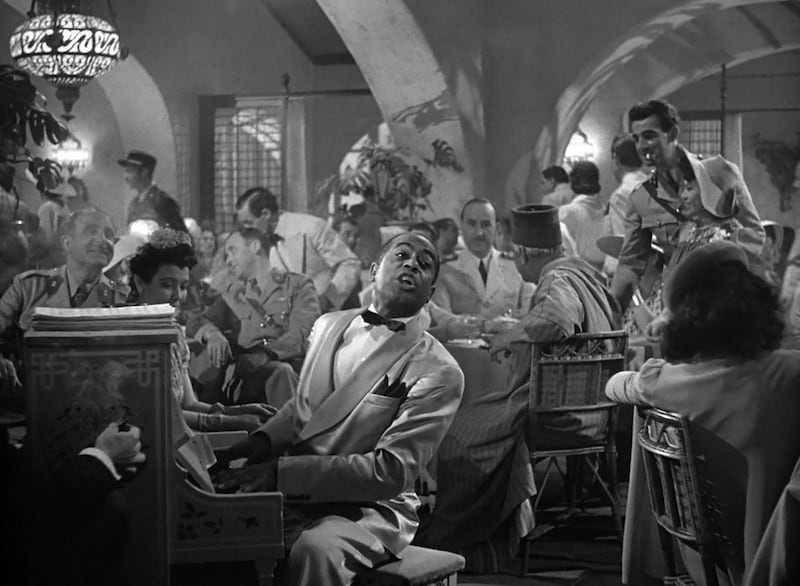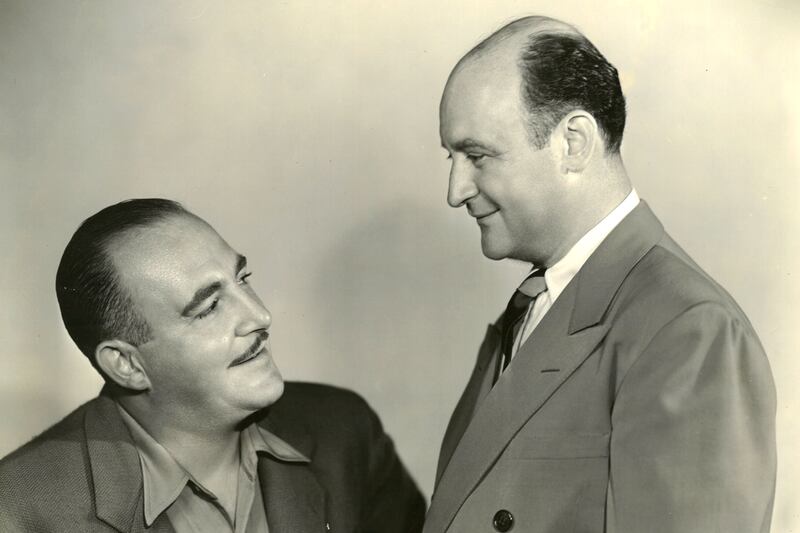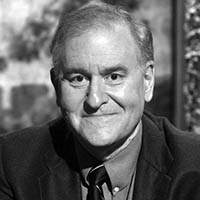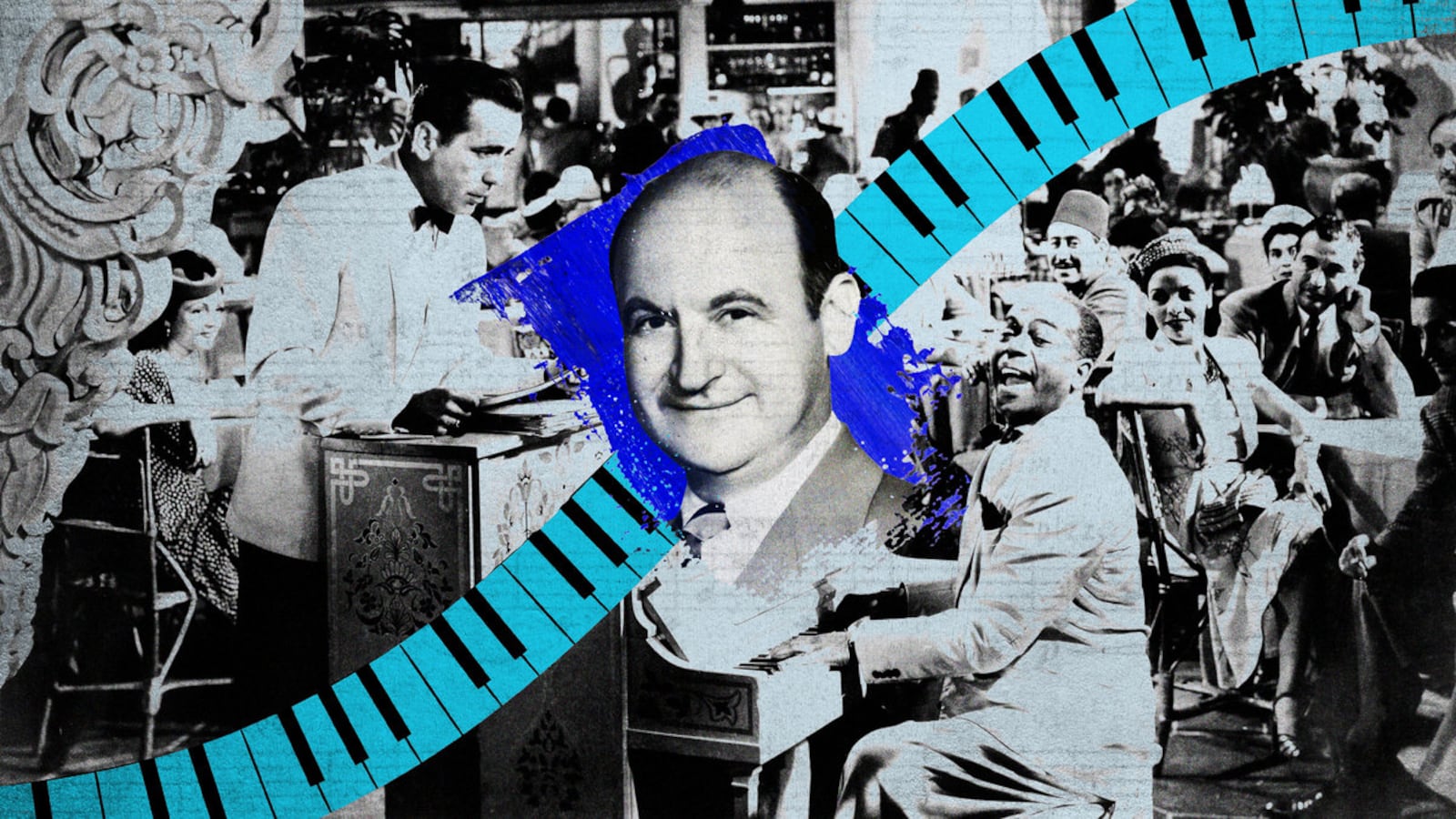Excerpted from The Tunesmith: The Musical Journey of M.K. Jerome.
In the beginning, and for many years afterward, Casablanca was just a movie. Those who were associated with the film (especially stars Humphrey Bogart, Sydney Greenstreet, Peter Lorre, and Claude Rains) did not live to hear CBS’s 60 Minutes declare in 1981 that Casablanca was “The Greatest Movie Ever Made.” Or that film buffs would celebrate its 80th anniversary in 2023.
For Warner Brothers songwriter M.K. (Moe) Jerome, my grandfather, Casablanca was just another assignment, in some ways a bit of a letdown after working on James Cagney’s Yankee Doodle Dandy in 1942, where he had played an important role, writing new songs and helping Cagney to dance like George M. Cohan, the man he was portraying.
There were other projects on Moe’s mind. He was working on “Song of the Bombardiers” for a Randolph Scott film titled Bombardier (1943). The song would become the official theme song of the Air Force’s brave men who sat in the vulnerable spot at the front of the airplane.
Moe was also interested in another film in the early planning stages, The Hard Way (1943), a hard-boiled, realistic film about the perils of show business that would reunite him with Joan Leslie (who had played Cagney’s wife in Yankee Doodle Dandy). He did work on the film, contributing songs and making an on-screen appearance as a piano player named “Joe.”
As for Casablanca, although it had an A-list cast and was going to be personally produced by the studio’s chief executive Hal Wallis, it was rumored around the studio to be nothing more than “a piece of romantic crap.”
It was not surprising that Moe was assigned to write songs for Casablanca. He had worked with its director Michael Curtiz on three previous films, and once Bogart won the role of Rick Blaine, it was almost certain that Moe would also get the job—he had worked with Bogart on eight earlier movies.
Working with Bogart was not a pleasant experience. In Swing Your Lady (1938), Bogart did not hide his unhappiness with this musical, calling it “the worst movie” he had ever made.
Producer Hal Wallis originally wanted three songs for Casablanca, something loud and jazzy, but uplifting, since the club’s audience would be a group of refugees who were desperately seeking a way to escape from Morocco, which was then controlled by the pro-Nazi French Vichy government. Moe and his lyricist partner Jack Scholl would also have to stick to the script, which also affected how he wrote the songs’ melodies.
Situational music
Later reflecting on the writing of “Knock on Wood,” Moe told his grandson how it differed from those songs he had written during his career on Tin Pan Alley from 1914 to 1929. They were written to appeal to an audience of song buyers who loved jazz; movie tunes, by contrast, were “situational” numbers, written to fit the story and move it along.
“Knock on Wood” would probably be sung by Dooley Wilson, who would play Sam, the chief entertainer at the club that Bogart’s character, Rick Blaine, runs in Casablanca. A veteran of the Black theater—where he often wore white makeup to play Irishmen, thus becoming known as “Dooley”—Wilson was a drummer whose early roles in Hollywood films were stereotypically degrading. Playing Sam, Blaine’s confidant and friend as well as employee, was both a personal breakthrough for Wilson and a racial breakthrough for Black actors. That is, if he could keep the job.

Wallis had first considered “colored girls” to play Sam—Lena Horne, Ella Fitzgerald, and Hazel Scott—then realized that would only complicate as well as undermine Rick’s relationship with Ilsa, played by Ingrid Bergman, his former lover whose arrival in Casablanca turns Rick’s world upside down. So Wilson was tested in April 1942, but Wallis remained lukewarm about him. The man couldn’t even play the piano! Jean Plummer, a staff musician, would play off camera as Wilson sang and fingered the keys. As late as June, when the film went into production and Wallis had seen Wilson sing, he told Leo Forbstein, head of the music department, to “find a Negro with a good crooning voice to double all of Dooley Wilson’s songs.” Moe was also skeptical about Wilson’s talents; he’d worked with the singer but Wilson’s lip-synching was terrible. It was finally decided that Wilson’s own voice would have to suffice.
So it was Dooley Wilson who sang Moe and his lyricist partner Jack Scholl’s “Knock on Wood,” the only original song written expressly for Casablanca that made it into the film. He also sang the many other American tunes (“It Had to Be You,” “Baby Face,” “Love For Sale”) featured in the cabaret scenes and, of course, “As Times Goes By.” Ironically, the screen credits would read:
SONGS ............................... M. K. Jerome and Jack Scholl
which led some reviewers, like The Hollywood Reporter, to give them, rather than composer Herman Hupfeld, credit for having written the song that would become a classic.
“Knock on Wood” was sung early in the film. The script read: “In the cafe, Sam is playing and singing the ‘Knock Wood’ number, accompanied by the orchestra. The spotlight is on Sam, and every time the orchestra comes in on the Knock Wood business, the spotlight swings over to the orchestra. Rick makes his way from the gambling room to Sam on the floor. During one of the periods when the spotlight is on the orchestra, Rick slips the letters of transit into the piano.”
The format of “Knock on Wood” is unusual, quite unlike anything Jack and Moe ever wrote before. It’s a call and response song. To Moe’s infectious swing tune, Jack added a clever lyric:
“Say, who’s got trouble?” Sam sings out.
“We got trouble,” both the members of the band and customers reply.
“How much trouble?” Sam asks.
“Too much trouble.”
“Well, now don’t you frown. Just knuckle down and knock on wood,” Sam sings as members of the band tap their heads with their fists.
“Who’s unhappy?” “We’re unhappy.” “How unhappy?” “Too unhappy.”
“Oh! Oh! That won’t do. When you are blue just knock on wood,” and again the band members tap their heads and now are joined by some in the audience.
“Who’s unlucky?” “We’re unlucky.” “How unlucky?” “Too unlucky.” “But your luck will change, if you’ll arrange to knock on wood.” “Who’s got nothing?”
“We got nothing.” “How much nothing?” “Too much nothing.” “Say, nothing’s not an awful lot, but knock on wood.” “Now who’s happy?” “We’re all happy.” “Just how happy?” “Very happy.” “That’s the way we’re going to stay, so knock on wood.”
“Now who’s lucky?” “We’re all lucky.” “Just how lucky?” “Very lucky.”
“We’ll smile again and once again let’s knock on wood.”
The song provides both entertainment and a diversion whereby Rick, temporarily in darkness, slips the vital “letters of transit,” a passport to legally leave Casablanca, into the back of Sam’s piano. Perhaps that’s why the song exists at all. Hal Wallis, determined to cut costs wherever he could, eventually wanted “the Knock Wood song” finished as quickly as possible. “Try and drop eight or 12 bars in there somewhere,” he ordered his film editor. This was only one of approximately 17 cuts he wanted made, from eliminating entire scenes to just trimming here and there.
Moe and Jack also wrote a second song, “Dat’s What Noah Done,” but it was a casualty of Wallis’ ruthless changes. It was supposed to be “an elaborate musical number to showcase Sam and the band” immediately following Peter Lorre’s arrest “as Rick tries to calm his frightened customers,” writes Harlan Lebo in his history, Casablanca: Behind the Scenes (1992). The scene was actually filmed but eliminated.

The popularity of Rick's
Noah Isenberg, author of We’ll Always Have Casablanca: The Life, Legend, and Afterlife of America’s Most Beloved Movie (2017), is pleased that “Knock on Wood” survived. “‘Knock on Wood’ lifts the spirits of all who inhabit Rick’s Cafe, the languishing refugees, the political officials, the underground resistance fighters et al,” notes Isenberg. “It also helps form an important transition, introducing the audience to the liveliness of the crowd and the excitement of the cafe. Now we know why everybody comes to Rick’s!”
Because of the continuing popularity of Casablanca, this one song of Moe Jerome’s has probably been seen and heard by more people around the world than any of the 1,500 songs he wrote during his long career, despite its brush with death at Wallis’ hands.
Thanks to author Noah Isenberg we know that among Casablanca’s most prominent fans were an American president and a U.S. senator who wanted to become president.
As the year 1942 ended, President Franklin D. Roosevelt invited friends to join him at the White House to watch Casablanca in a private showing.
Seventy-four years later in 2016, Massachusetts Senator Elizabeth Warren and her husband celebrated New Year’s Eve drinking Champagne, eating “lots of good cheeses,” and watching Casablanca.
“The movie gets to me every time,” Warren told her Facebook friends.
“It’s about love, loyalty, and courage,” she wrote. “It’s also about refugees. Casablanca was a step along the route of people fleeing the terror of the Nazis. Young people on the threshold of building a new life, and old people hoping for a safe landing place. The movie was shot in early 1942 against a backdrop of Jews fleeing persecution and death, but the mix of people meeting in Casablanca speaks to the pain and vulnerability of all people forced to run from their homes in order to survive. Casablanca is about a very real threat to humanity, but also about how people survive, flourish and fight back.’’
Excerpted from The Tunesmith: The Musical Journey of M.K. Jerome, copyright 2023 by Gary May and reprinted with permission.





